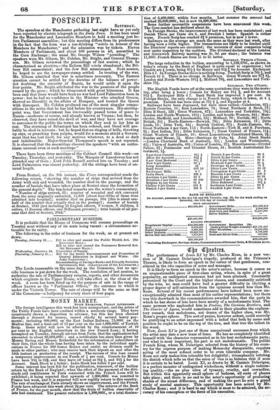POSTSCRIPT.
SAT17RDAY.
The speeches at the Manchester gathering last night have as yet only been reported by electric telegraph in the Daily News. It has been usual for the Manchester and Lancashire Members to hold a meeting just be- fore Parliament assembles ; but this meeting differs from its predecessors in the fact that the form was a tea-drinking "soirée in honour of the Members for Manchester," and the admission was by tickets. Eleven Members of Parliament, and about 800 persons in all, assembled in the Corn Exchange ; the usual Mr. George Wilson "presiding." The speakers were Mr. Gibson, Mr. Cobden, Mr. Bright, and General Thomp- son. Mr. Gibson reviewed the proceedings of last session ; 'which he characterized as abortive,—the Reform Bill wisely abandoned ; the Bri- bery Bill emasculated; and the Jew Bill mismanaged. Next session, be hoped to see the newspaper-stamp settled. In treating of the war, Mr. Gibson admitted that war is sometimes necessary. The Eastern question cannot be settled by the doctrine of the balance of power : not doubting the sincerity of Russia, he would settle it upon the four points. Mr. Bright attributed the war to the passions of the people roused by the press ; which he vituperated with great bitterness. It has been said that there would have been no war had Lord Palmerston been in power : but he had no confidence in the Minister who attacked Greece, showed no liberality in the affairs of Hungary, and treated the Queen with disrespect. Mr. Cobden produced one of the most singular compo- sitions in the series that he has laid before his countrymen. His starting- 'lit was, that Government has irrevocably passed terms of peace to Russia'—moderate of course, and already known at Vienna; but then, he observed, they have raised the devil of war, and they have not courage to announce to the public the terms on which they seek to lay him at rest. The storming of Sebastopol has been ordered, and blood will pro- bably be shed in torrents : but he hoped that no ringing of bells, throwing
up caps, or preaching from pulpits, would for a moment shield a Govern- ment that has lent itself, for any motives whatever, to a deed so dark and indefensible. Major-General Thompson's speech is not reported. It is observed that the assemblage cheered the speakers "with an enthu- siasm unusual even at such meetings,"


























 Previous page
Previous page